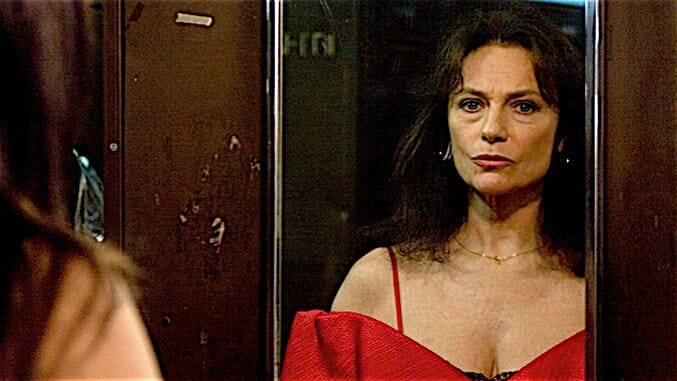A Softer Light: Catching Up with Jacqueline Bisset

If Jessica Chastain’s stunning 2011 had a forbearer in the “bursting onto the scene in one year” category, it would have to be Jacqueline Bisset in 1968, when she kicked off her career by starring in a trio of movies. There was The Detective, an underrated police drama with Frank Sinatra, Robert Duvall and Lee Remick. And there was The Sweet Ride, an Easy Rider precursor for which she was nominated for a Golden Globe. And of course, she starred—unforgettably—opposite Steve McQueen in Bullitt. As her career progressed into the ’70s and ’80s, she became one of the most famous actresses in the world, starring in films like Airport, Oscar winner Day for Night, Class, The Greek Tycoon, and of course The Deep.
And embedded in that “of course” preceding The Deep in that last sentence is one of the chief contradictions in Bisset’s career. She’s worked with some of the top directors of her time—Roman Polanski, John Huston, Francois Truffaut, Sidney Lumet, Stanley Donen, and others just in the first decade of her career, for instance, with many more greats after that. She’s turned in consistently excellent work—she’s been nominated for Golden Globes in five of the last six decades. And she was even awarded the French Legion d’Honneur in 2010. And yet, for many, it all comes back to her admittedly breathtaking beauty. (Time famously called her “the most beautiful actress in history.”) Perhaps it’s that famously revealing photo that was taken (without her consent, it should be said) on the set of The Deep. Perhaps it’s the way that she embraced glamour in a way that some stage beauties of the past were not able. Or maybe it’s just that, for most of her career, some observers have been unable to imagine that perhaps great beauty and great talent might come in the same package.
Whatever the reason, the long and storied career of Jacqueline Bissett is one worth celebrating. On the eve of the premiere of yet another film, this one a madcap comedy with the late Dennis Hopper (The Last Film Festival, which opens this weekend), Paste spoke to Bisset about the film, about Hopper, about film festivals, and about that famous California light.
Paste: Tell us about how you came to this project. Was it through Dennis Hopper?
Jacqueline Bisset: No, I had a movie in Sundance—Something and Love… I can’t remember. What the hell was it?
Paste: Maybe Death in Love?
Bisset: Yes! Death in Love! That was it! I asked Linda Yellen to come with me, because she’s a friend. She heard Dennis Hopper was there, and arranged to meet him. And unbeknownst to me, she had started working on this idea. When she asked me to be in it, she said the movie was going to be, basically, improvised. And I said, “Well, I’m not sure I know how to do that.” I was a bit leery of it, as was Dennis. She said, “I’d like you to play an actress,” and I said, “Well, that’s not terribly interesting to me. But is there any chance it could be an Italian woman?” Because as a teenager, I had two characters I used to play at home and make my mother laugh, quite a lot—one was Italian, one was cockney. I thought, “Well, maybe that character could make this more amusing?” So she said, “Okay, yeah.”
Paste: Sure, sure. Well, your accent in the film really is a great touch. It’s very, very comic. Works very well.
Bisset: Thanks. I thought it worked well, because otherwise she’d just be a whining actress, and an Italian whining actress? It’s just funnier.
Paste: Something about her haughtiness works very well with the Italian, you know?
Bisset: (Laughs) That’s good. I’m glad you liked it.
Paste: And then, I mean—
Bisset: What kind of film would you say this is? Somebody said it’s farce. Do you think it’s farce?
Paste: I think farce is not a bad way to describe it; it’s certainly madcap. I don’t know, it might have a few too many real-life moments to make it a complete farce.
Bisset: Yes.